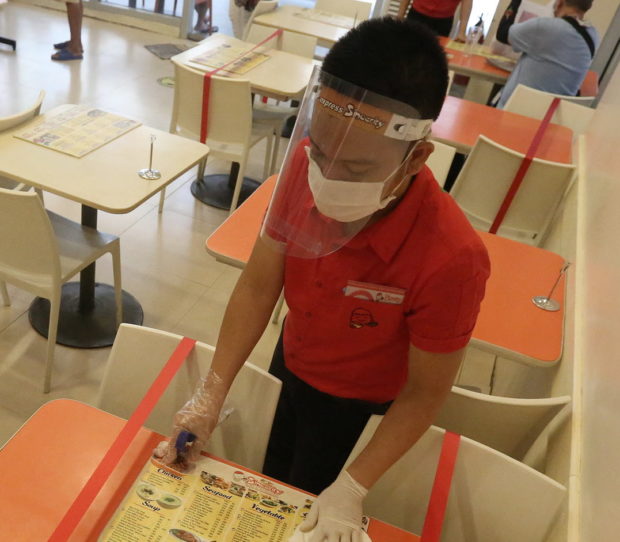COVID jab now a must for on-site workers

NEW POSITION After saying earlier that nonvaccination is not a legal basis for dismissal, Labor Secretary Silvestre Bello III now said establishments covered by IATF guidelines for restaurants and spas can fire employees who refuse to get inoculated. —MARIANNE BERMUDEZ
MANILA, Philippines — Starting Dec. 1, all on-site workers in both the private and public sectors will be required to be inoculated against COVID-19 if there is sufficient supply of the vaccine in their areas.
Unvaccinated workers may not be terminated but they will have to regularly undergo a reverse transcription-polymerase chain reaction test (RT-PCR) or an antigen test at their own expense.
These are among the new measures introduced by the Inter-Agency Task Force for the Management of Emerging Infectious Diseases (IATF) to ramp up the government’s COVID-19 vaccination drive.
Also, the IATF said all public land, rail, marine and air transport service providers must require all their eligible workers to be fully vaccinated before they could continue their operations.
Workers who have proof of their confirmed vaccination schedule would not be considered absent if they are getting the jab during work hours.
Article continues after this advertisementFor those not eligible for vaccination, however, they need to present a medical clearance issued by a government health office or birth certificate as proof of their ineligibility, it said.
Article continues after this advertisementAccording to the task force, business establishments, although they are not required to accommodate only fully vaccinated customers, may refuse entry or deny service to individuals who are unvaccinated despite being eligible for the jab or those only partially vaccinated.
But those providing frontline and emergency services should continue to assist all people in need of assistance whether they are vaccinated or not, it said.
Offer perks, LGUs asked
The IATF has called on local government units (LGUs) to help boost the government’s vaccination drive by issuing ordinances providing incentives to fully vaccinated individuals and establishments that implement measures that promote vaccination among their employees and clients. For instance, proof of vaccination may be required before individuals will be allowed to undertake or qualify to participate in certain activities, it said.
Government agencies were also urged to implement measures that would prioritize fully vaccinated individuals who were availing themselves of government programs and services.
The government is ramping up its mass immunization drive with the goal of covering at least 50 percent of the population by the end of the year.
It earlier announced it would hold a three-day nationwide vaccination event from Nov. 29 to Dec. 1 and was considering declaring this period a nonworking holiday to give as many people as possible the opportunity to get the jab.
Unauthorized boosters
In another development, Health Undersecretary Maria Rosario Vergeire said the government could not be held liable for any adverse reactions to the unauthorized administration of booster shots for COVID-19.
Vergeire made this statement in light of reports that booster shots or additional vaccine doses were being given to some individuals even in the absence of an emergency use authorization (EUA), which is issued to unregistered drugs and vaccines in times of a public health emergency.
“We have been hearing reports of people getting booster shots. They have to understand that the vaccines you’re using don’t have emergency use [authorization]. If there would be problems or untoward reactions to this booster doses, the government cannot be held accountable,” Vergeire said at a press briefing on Friday.
Protocol violation
“Those who gave you the vaccines and the ones who have sourced out the vaccines” should be held accountable, she stressed.
The Department of Health (DOH) spokesperson warned those who had received or about to get boosters prior to the issuance of an EUA that “[they] are violating national protocol” as there was still no guidelines for the use of the additional shots of COVID-19 vaccines.
“This is not to restrict or to control the release of vaccines … but for the government to ensure that the vaccines would be safe and effective for our countrymen,” Vergeire said.
FDA evaluation
Also, she said the Food and Drug Administration (FDA) had yet to complete its evaluation of the booster doses for the vulnerable sector, such as the immunocompromised, seniors and the health-care workers. The results of the evaluation are expected to be issued next week.
The DOH is also awaiting the final recommendation from the Strategic Advisory Group of Experts on Immunization, an advisory body to the World Health Organization, before the government can give the go-ahead for the boosters.
So far, four vaccine manufacturers—Pfizer, AstraZeneca, Sinovac and Sputnik V—have applied for EUA for boosters.
But no manufacturer has applied yet for the vaccination of children age 5 to 11 years old. The use of Pfizer vaccines for this age group was recently approved by the US FDA.